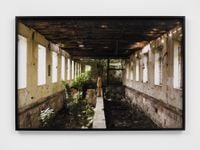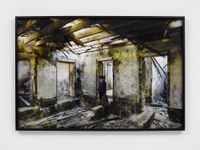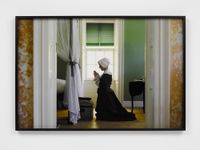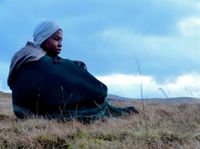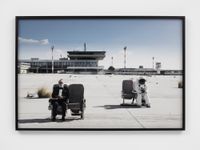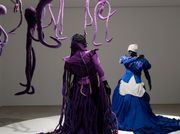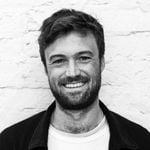John Akomfrah CBE is a Ghana-born pioneering filmmaker and artist based in London. He is internationally known for his collaboratively produced films and multi-screen video installations exploring memory, temporality, colonialism and post-colonialism, and experiences of global diaspora.
Read MoreAkomfrah emerged on the filmmaking scene in London as a co-founder of Black Audio Film Collective in 1982. His compatriots in this endeavour were the artists Lina Gopaul and David Lawson, with whom he also founded Smoking Dog Films (established in 1998).
Black Audio Film Collective's first film essay, Handsworth Songs (1986), examined the Birmingham and London riots in 1985 in a multi-layered style combining archival images, newsreels, and interviews. The internationally prize-winning film, which challenged mainstream representation, was screened on the United Kingdom's Channel Four Television channel. It established Akomfrah's distinct, multi-angular approach to challenging topics.
Akomfrah developed this approach in multiple experimental films responding to mounting social unrest in Britain through the 1980s. Such John Akomfrah films draw upon the influence of filmmakers like Chris Marker, Theodoros Angelopoulos, and Jean-Luc Godard, as well as thinkers such as British-Jamaican sociologist Stuart Hall. The Unfinished Conversation (2012) focused especially on the life and cultural theories of the latter.
Atmospheric and highly reflective in their execution, John Akomfrah's movies examine personal and collective memories, and establish dialogues between disparate images and narratives throughout history. In conversation with Ocula Magazine in 2018, Akomfrah explained, 'I try to persuade things to move into other spaces in which they can acquire a new garment of identity.'
In John Akomfrah's Vertigo Sea (2015), the artist brought together archival material, classical literature, and new footage. The three-screen installation also contrasted cruel and disturbing scenes from the whaling industry with different generations of migrants embarking on epic ocean crossings to find a better future. The Airport (2016) also brought together different eras and generations together in dialogue through its characters.
Environmental concerns have been a recurring motif in much of Akomfrah's work. This can be seen in the six-channel video installation Purple (2017)—one of Akomfrah's largest works of that decade—and Four Nocturnes (2019), which both examine broader themes relating to humanity's destruction of the natural world.
A filmmaker with a significant following, John Akomfrah's films have featured in several major international film festivals and awards. In 2017 he was awarded the Artes Mundi 7 Prize. Akomfrah's art can also be found in major institutional collections, such as those of Tate, London; Centre Pompidou, Paris; The Museum of Modern Art, New York; National Gallery of Canada, Ottowa; and the Solomon R. Guggenheim Museum, New York.
The Unintended Beauty of Disaster, Lisson Gallery, London (2020); John Akomfrah, Secession, Vienna (2020); John Akomfrah: Future History, Seattle Art Museum (2020); John Akomfrah: Signs of Empire, New Museum, New York (2018); Lateral Time: John Akomfrah and Smoking Dogs Films, National Gallery of Art, Washington, D.C. (2017); Vertigo Sea, Bildmuseet, Umeå, Sweden (2015); BP Spotlight: John Akomfrah, The Unfinished Conversation, Tate Britain, London (2013).
Our World is Burning, Palais de Tokyo, Paris (2020); Get Up, Stand Up Now: Generations of Black Creative Pioneers, Somerset House, London (2019); Take Liberty!, National Museum, Oslo (2014); Africa Now—Political Patterns, Seoul Museum of Art (2014); After Year Zero, Haus der Kulturen der Welt, Berlin (2013); Racing the cultural interface: African diasporic identities in the digital age, Centre Pompidou, Paris (2005).
Michael Irwin | Ocula | 2021
